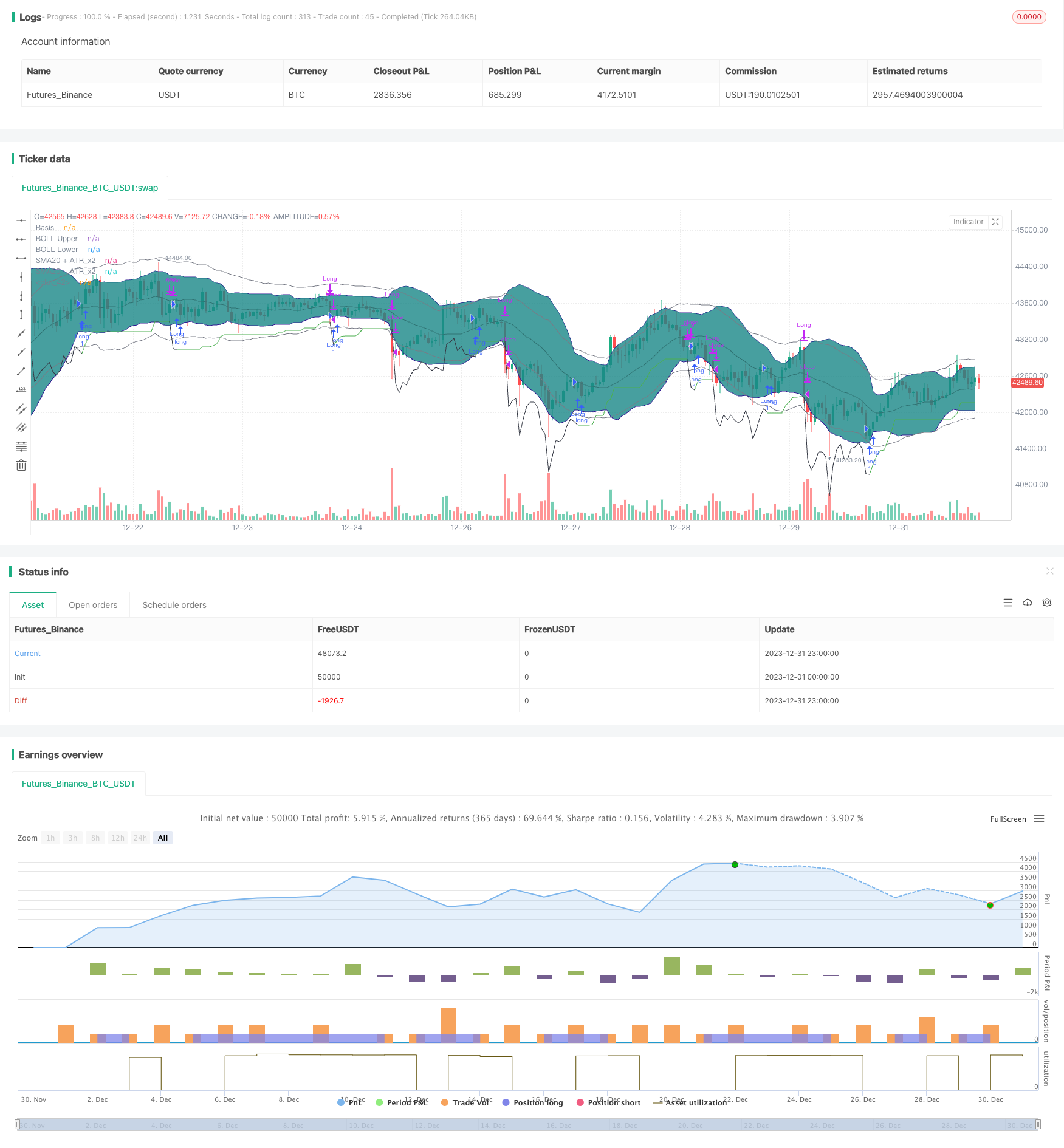Bollinger Bands and RSI Combination Strategy
Author: ChaoZhang, Date: 2024-01-30 15:15:32Tags:

Overview
This strategy combines Bollinger Bands and Relative Strength Index (RSI) to identify opportunities when Bollinger Bands are squeezing and RSI is rising, with trailing stop loss to control risks.
Strategy Logic
The core logic of this strategy is to identify Bollinger Bands squeeze and predict price breakout when RSI is in uptrend. Specifically, when 20-period BB middle band standard deviation is less than ATR*2, we determine BB squeeze happening; meanwhile, if both 10 and 14 period RSI are rising, we predict prices may break above BB upper band soon and go long.
After entering the market, we use ATR safety distance + adaptive stop loss to lock profit and manage risks. Positions will be closed when price hits stop loss or RSI becomes overbought (14-period RSI above 70 and 10-period RSI exceeds 14).
Advantage Analysis
The biggest advantage of this strategy is to identify consolidation period with BB squeeze and predict breakout direction with RSI. Also, using adaptive stop loss based on market volatility rather than fixed stop loss can better lock profit while controlling risk.
Risk Analysis
The major risk of this strategy is misidentification of BB squeeze and RSI uptrend, which may lead to false breakout. Besides, adaptive stop loss may fail to close positions timely during high volatility. Improving stop loss methods like curve stop loss can mitigate this risk.
Optimization Guidelines
This strategy can be further optimized in the following aspects:
-
Improve BB parameters to identify squeeze more accurately
-
Test different values for RSI periods
-
Examine other stop loss techniques like curve SL or back-looking SL
-
Adjust parameters based on symbol characteristics
Conclusion
This strategy leverages the complementarity of BB and RSI to achieve good risk-adjusted returns. Further optimizations on aspects like stop loss and parameter tuning can make it fit better for different trading instruments.
/*backtest
start: 2023-12-01 00:00:00
end: 2023-12-31 23:59:59
period: 1h
basePeriod: 15m
exchanges: [{"eid":"Futures_Binance","currency":"BTC_USDT"}]
*/
// This source code is subject to the terms of the Mozilla Public License 2.0 at https://mozilla.org/MPL/2.0/
// © DojiEmoji
//
//@version=4
strategy("[KL] BOLL + RSI Strategy",overlay=true,pyramiding=1)
// Timeframe {
backtest_timeframe_start = input(defval = timestamp("01 Apr 2016 13:30 +0000"), title = "Backtest Start Time", type = input.time)
USE_ENDTIME = input(false,title="Define backtest end-time (If false, will test up to most recent candle)")
backtest_timeframe_end = input(defval = timestamp("01 May 2021 19:30 +0000"), title = "Backtest End Time (if checked above)", type = input.time)
within_timeframe = true
// }
// Bollinger bands (sdv=2, len=20) {
BOLL_length = 20, BOLL_src = close, SMA20 = sma(BOLL_src, BOLL_length), BOLL_sDEV_x2 = 2 * stdev(BOLL_src, BOLL_length)
BOLL_upper = SMA20 + BOLL_sDEV_x2, BOLL_lower = SMA20 - BOLL_sDEV_x2
plot(SMA20, "Basis", color=#872323, offset = 0)
BOLL_p1 = plot(BOLL_upper, "BOLL Upper", color=color.navy, offset = 0, transp=50)
BOLL_p2 = plot(BOLL_lower, "BOLL Lower", color=color.navy, offset = 0, transp=50)
fill(BOLL_p1, BOLL_p2, title = "Background", color=#198787, transp=85)
// }
// Volatility Indicators {
ATR_x2 = atr(BOLL_length) * 2 // multiplier aligns with BOLL
avg_atr = sma(ATR_x2, input(1,title="No. of candles to lookback when determining ATR is decreasing"))
plot(SMA20+ATR_x2, "SMA20 + ATR_x2", color=color.gray, offset = 0, transp=50)
plot(SMA20-ATR_x2, "SMA20 - ATR_x2", color=color.gray, offset = 0, transp=50)
plotchar(ATR_x2, "ATR_x2", "", location = location.bottom)
//}
// Trailing stop loss {
TSL_source = low
var entry_price = float(0), var stop_loss_price = float(0)
trail_profit_line_color = color.green
if strategy.position_size == 0 or not within_timeframe
trail_profit_line_color := color.black
stop_loss_price := TSL_source - ATR_x2
else if strategy.position_size > 0
stop_loss_price := max(stop_loss_price, TSL_source - ATR_x2)
plot(stop_loss_price, color=trail_profit_line_color)
if strategy.position_size > 0 and stop_loss_price > stop_loss_price[1]
alert("Stop loss limit raised", alert.freq_once_per_bar)
// } end of Trailing stop loss
//Buy setup - Long positions {
is_squeezing = ATR_x2 > BOLL_sDEV_x2
if is_squeezing and within_timeframe and not is_squeezing[1]
alert("BOLL bands are squeezing", alert.freq_once_per_bar)
else if not is_squeezing and within_timeframe and is_squeezing[1]
alert("BOLL bands stopped squeezing", alert.freq_once_per_bar)
ema_trend = ema(close, 20)
concat(a, b) =>
concat = a
if a != ""
concat := concat + ", "
concat := concat + b
concat
// }
// Sell setup - Long position {
rsi_10 = rsi(close, 10), rsi_14 = rsi(close, 14)
overbought = rsi_14 > input(70,title="[Exit] RSI(14) value considered as overbought") and rsi_10 > rsi_14
// } end of Sell setup - Long position
// MAIN: {
if within_timeframe
entry_msg = ""
exit_msg = ""
// ENTRY {
conf_count = 0
volat_decr = avg_atr <= avg_atr[1]
rsi_upslope = rsi_10 > rsi_10[1] and rsi_14 > rsi_14[1]
if volat_decr and rsi_upslope and is_squeezing and strategy.position_size == 0
strategy.entry("Long",strategy.long, comment=entry_msg)
entry_price := close
stop_loss_price := TSL_source - ATR_x2
// }
// EXIT {
if strategy.position_size > 0
bExit = false
if close <= entry_price and TSL_source <= stop_loss_price
exit_msg := concat(exit_msg, "stop loss [TSL]")
bExit := true
else if close > entry_price and TSL_source <= stop_loss_price
exit_msg := concat(exit_msg, "take profit [TSL]")
bExit := true
else if overbought
exit_msg := concat(exit_msg, "overbought")
bExit := true
strategy.close("Long", when=bExit, comment=exit_msg)
// }
// }
// CLEAN UP:
if strategy.position_size == 0 and not is_squeezing
entry_price := 0
stop_loss_price := float(0)
- MACD and RSI Based 5-Minute Momentum Trading Strategy
- Double Fractal Breakout Strategy
- Noro Shifted Moving Average Stop Loss Strategy
- Double Exponential Moving Average RSI Trading Strategy
- Simple Moving Average Crossover Strategy
- Scalping Strategy Based on Market Liquidity and Trend
- Cross-Border Short-Term Breakthrough Reversal 5EMA Strategy
- RSI Indicator Based Stock Trading Pyramiding Strategy
- All about EMA Channel Trading Strategy
- Double Decker RSI Trading Strategy
- Double Inside Bar & Trend Strategy
- Amazing Price Breakout Strategy
- Robust Trend Continuation Strategy
- Trend Tracking Moving Average Crossover Strategy
- Breakout Reversal Model Based on Turtle Trading Strategy
- Momentum Trend Strategy
- Peanut 123 Reversal and Breakout Range Short-term Trading Strategy
- Smoothed RSI Based Stock Trading Strategy
- Smooth Volatility Band Strategy
- Commodity Channel Index Reversal Trading Strategy